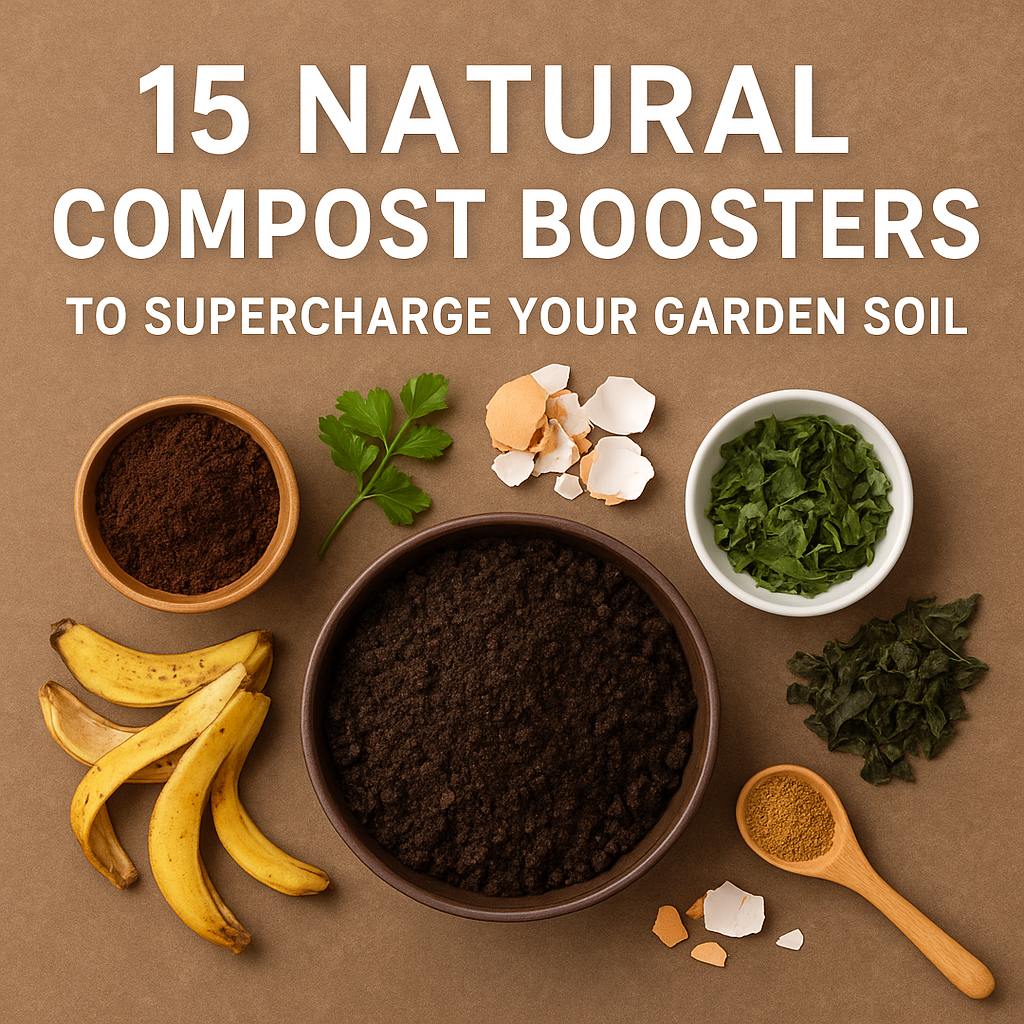Boost your garden’s growth naturally with these 15 simple compost boosters. By adding everyday kitchen scraps, garden clippings, and natural amendments, you can enrich your soil, speed up decomposition, and give your plants the nutrients they need to thrive. These eco-friendly methods are easy to try and highly effective for any gardener.
1. Coffee Grounds for Nitrogen Boost
Sprinkle used coffee grounds into your compost to add nitrogen, which helps balance carbon-rich materials like dried leaves. I usually save my morning coffee grounds in a small container on the counter—it’s like giving your compost a daily mini energy drink.
2. Crushed Eggshells for Calcium
Finely crush eggshells and mix them into your compost to provide calcium. This helps prevent blossom end rot in tomatoes and peppers. I like to collect eggshells in a jar in the fridge, then crush them with a rolling pin—makes it easy to add them when needed.
3. Green Tea Leaves
Used green tea leaves are great for adding nutrients and slightly acidifying compost, which is perfect for acid-loving plants like azaleas or blueberries. After enjoying a cup of tea, I just toss the leaves directly into my compost bin; it’s a simple habit that makes a difference over time.
4. Seaweed or Kelp
Rinse and chop seaweed before adding it to your compost to give it a natural boost of trace minerals and growth hormones. I once had a neighbor bring me a bag from a beach trip, and my garden literally perked up overnight—it’s like magic from the sea.
5. Molasses as a Compost Activator
Mix a spoon of molasses with water and pour it into your compost to feed microbes and speed up decomposition. I usually do this on weekends while turning my compost; it smells sweet and feels like giving your garden a little treat.
6. Wood Ash for Potassium
Sprinkle a thin layer of wood ash from untreated wood onto your compost to add potassium and slightly raise the pH. I usually save ashes from our fireplace in a small tin, and it’s amazing how a little sprinkle can make my tomato plants thrive.
7. Epsom Salt Solution
Dissolve a bit of Epsom salt in water and pour it over your compost to provide magnesium and sulfur. I keep a small container of Epsom salt in the garden shed—it’s such a quick trick when I notice plants looking a little pale.
8. Alfalfa Meal or Pellets
Mix alfalfa meal or pellets into your compost to provide nitrogen and natural growth hormones. I like to toss in a handful when I turn the pile; it feels like giving your soil a gentle energy boost.
9. Chopped Citrus Peels
Add small pieces of orange, lemon, or lime peels to your compost. They break down nicely, add phosphorus, and leave a refreshing scent. Whenever I make fresh juice, I chop the peels and toss them in—double duty for breakfast and the garden.
10. Herb Clippings
Toss in leftover basil, mint, or parsley clippings to add nutrients and naturally repel pests. I keep a small bowl on the counter for herb trimmings—it’s like giving my compost a flavorful, healthy treat.
11. Used Mushroom Substrate
Recycle spent mushroom substrate into your compost to add rich organic matter. I once saved a bag from a mushroom kit, and mixing it in really made my soil feel soft and alive—like it was thanking me.
12. Beer or Yeast Mix
Pour leftover flat beer or a diluted yeast solution over your compost to feed beneficial bacteria. I usually use a tiny amount from an opened bottle; it’s funny how something you’d toss can give your garden a microbial boost.
13. Grass Clippings Layer
Add thin layers of fresh grass clippings—they’re high in nitrogen. Be careful not to pile them too thickly, or it can smell a bit. I mow my lawn and sprinkle the clippings gradually; it’s a nice way to recycle while keeping the smell in check.
14. Stale Bread or Rice
Break stale bread or leftover rice into small pieces and mix them into your compost. They provide carbohydrates for microbes, and I’ve found it’s a clever way to reduce kitchen waste while helping my garden grow.
15. Manure Tea
Soak well-aged animal manure (cow, horse, or rabbit) in water, then pour the liquid into compost to add beneficial microbes and nutrients. I make a small batch in a bucket and watch how my compost bubbles with life afterward—it’s like giving your soil a spa treatment.
Incorporating these natural compost boosters into your garden routine will help create healthy, nutrient-rich soil that supports stronger, more productive plants. Experiment with different combinations to find what works best for your garden, and enjoy the satisfaction of growing greener, healthier plants naturally.


